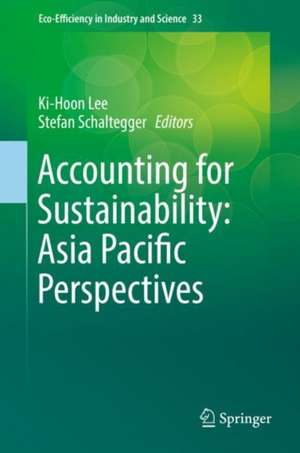Accounting for Sustainability: Asia Pacific Perspectives: Eco-Efficiency in Industry and Science, cartea 33
Editat de Ki-hoon Lee, Stefan Schalteggeren Limba Engleză Hardback – 8 feb 2018
| Toate formatele și edițiile | Preț | Express |
|---|---|---|
| Paperback (1) | 728.11 lei 6-8 săpt. | |
| Springer International Publishing – 6 iun 2019 | 728.11 lei 6-8 săpt. | |
| Hardback (1) | 1115.46 lei 6-8 săpt. | |
| Springer International Publishing – 8 feb 2018 | 1115.46 lei 6-8 săpt. |
Din seria Eco-Efficiency in Industry and Science
- 18%
 Preț: 951.29 lei
Preț: 951.29 lei - 15%
 Preț: 640.24 lei
Preț: 640.24 lei - 18%
 Preț: 949.10 lei
Preț: 949.10 lei - 15%
 Preț: 654.77 lei
Preț: 654.77 lei - 15%
 Preț: 648.42 lei
Preț: 648.42 lei -
 Preț: 391.61 lei
Preț: 391.61 lei - 15%
 Preț: 642.51 lei
Preț: 642.51 lei - 15%
 Preț: 643.34 lei
Preț: 643.34 lei - 18%
 Preț: 957.62 lei
Preț: 957.62 lei - 18%
 Preț: 953.35 lei
Preț: 953.35 lei - 18%
 Preț: 1238.74 lei
Preț: 1238.74 lei - 18%
 Preț: 1224.68 lei
Preț: 1224.68 lei - 18%
 Preț: 963.15 lei
Preț: 963.15 lei - 18%
 Preț: 2115.07 lei
Preț: 2115.07 lei - 18%
 Preț: 1388.53 lei
Preț: 1388.53 lei - 18%
 Preț: 1861.27 lei
Preț: 1861.27 lei - 18%
 Preț: 1234.94 lei
Preț: 1234.94 lei - 15%
 Preț: 643.00 lei
Preț: 643.00 lei - 15%
 Preț: 647.40 lei
Preț: 647.40 lei - 18%
 Preț: 1222.01 lei
Preț: 1222.01 lei - 15%
 Preț: 637.59 lei
Preț: 637.59 lei - 15%
 Preț: 648.42 lei
Preț: 648.42 lei - 15%
 Preț: 646.62 lei
Preț: 646.62 lei - 15%
 Preț: 645.79 lei
Preț: 645.79 lei - 20%
 Preț: 590.94 lei
Preț: 590.94 lei
Preț: 1115.46 lei
Preț vechi: 1360.32 lei
-18% Nou
Puncte Express: 1673
Preț estimativ în valută:
213.47€ • 222.58$ • 177.41£
213.47€ • 222.58$ • 177.41£
Carte tipărită la comandă
Livrare economică 20 martie-03 aprilie
Preluare comenzi: 021 569.72.76
Specificații
ISBN-13: 9783319708980
ISBN-10: 3319708988
Pagini: 341
Ilustrații: XX, 305 p. 53 illus.
Dimensiuni: 155 x 235 mm
Greutate: 0.64 kg
Ediția:1st ed. 2018
Editura: Springer International Publishing
Colecția Springer
Seria Eco-Efficiency in Industry and Science
Locul publicării:Cham, Switzerland
ISBN-10: 3319708988
Pagini: 341
Ilustrații: XX, 305 p. 53 illus.
Dimensiuni: 155 x 235 mm
Greutate: 0.64 kg
Ediția:1st ed. 2018
Editura: Springer International Publishing
Colecția Springer
Seria Eco-Efficiency in Industry and Science
Locul publicării:Cham, Switzerland
Cuprins
Editorial (Ki-Hoon Lee and Stefan Schaltegger).- Introduction.- Part I – National Culture and Sustainability Accounting in the Asia Pacific Region.- 1. National culture and its impacts on environmental and Sustainability Management Accounting practices in Asia Pacific Region (Ki-Hoon Lee & David Herold).- 2. Country readiness in adopting Integrated Reporting: A Diamond Theory approach from an Asia Pacific economy (Nuwan Gunarathne & Samanthi Senaratne).- 3. Corporate values and corporate social responsibility communication strategies in a Small Economy: The case of New Zealand (Radiah & Rashid).- Part II – Environmental and Sustainability Performance Measurement and Management.- 4. Managing eco-efficiency for business sustainability: An investigation of top carbon polluters in Australia (Wei Qian et al. ).- 5. The role of business networking on sustainable performance (Riana and Lanita).- 6. Improving corporate performance with final ecosystem services (Charles etal.).- Part III – Environmental Management Accounting: Material Flows, Cost Accounting, and Business Cases.- 7. Cost behaviour of environmental protection and social contribution activities: Korean evidence (Yook and Kim).- 8. Lean-MFCA in Thailand (Wichai).- 9. Is Japanese MFCA useful to Vietnam? (Nguyen).- Part IV - Sustainability Reporting: Challenges and Approaches.- 10.The functional differentiation between the International Integrated Reporting Council (IIRC) and the Global Reporting Initiative (GRI) in the sphere of sustainability reporting (Ogata et al.).- 11. Determinants of voluntary environmental reporting by New Zealand local authorities (Radiah et al.).- Acknowledgement (including reviewers list).
Notă biografică
.
Textul de pe ultima copertă
This book advances the understanding of corporate sustainability and challenges and roles of sustainability accounting in the Asia-Pacific region. The Asia-Pacific region has shown fast economic growth for several decades which is expected to continue. In this context, Asia has become the “production engine” of the global economy. At the same time scientific reports reveal that some planetary boundaries are crossed, for example relating to biodiversity and climate change. Companies in the Asia-Pacific region are therefore increasingly challenged to reduce their environmental impacts, to document their social contribution and to contribute to sustainable development. Key approaches to identify sustainability problems and challenges, to support improvement processes and to back up sustainability contributions include accounting and reporting. In contrast to the high relevance of accounting and reporting for corporate sustainability for the Asia-Pacific region, academic research has so far been dominated by Western researchers and pre-dominantly dealt with Western and Japanese cases and approaches. It is thus time to take account of Asian perspectives on accounting and reporting for sustainability in the Asia-Pacific region.
Caracteristici
Addresses the research-practice gap in the sustainability accounting and reporting field between academic researches and corporate practices Provides rich insights of different cultural and industrial cases in the Asia-Pacific region Offers analysis and multi-case study from the Asia-Pacific region
